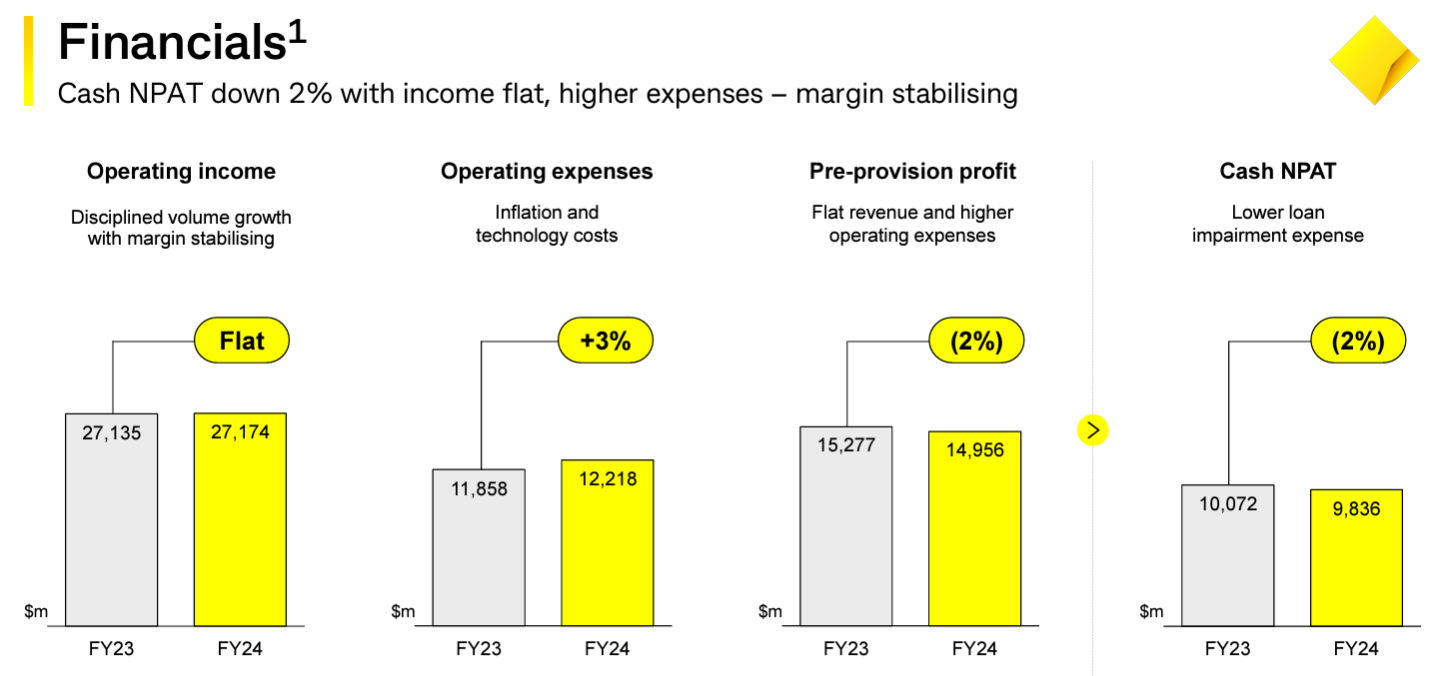CBA beat FY24 dividend and profit expectations. But it's still too "expensive"
There’s not a single Commonwealth Bank (ASX: CBA) bull in sight – yet its FY24 earnings remain solid, underscoring the resilience of the Australian economy
"Higher interest rates are slowing the economy and gradually moderating inflation. Australia remains well positioned but downside risks continue around productivity, housing affordability, as well as ongoing global uncertainty," said Chief Executive Matt Comyn.
But no matter what CBA does, its valuation remains a concern that cannot be ignored. The bank continues to trade at a price-to-earnings of around 23x – around double that of its Big Four peers and well-above its long-term average of around 15x.
Matthew Davison, Portfolio Manager at Martin Currie offers further insights on CBA's results and key risks, acknowledging the bank's quality earnings and balance sheet while flagging its expensive price tag.
Commonwealth Bank FY24 Key Results
- Cash net profit down 2% to $9.83 billion
- Net interest margin down 8 bps to 1.99%
- Credit quality down 28% to $802 million
- Final dividend of $2.50 per share
- Total dividend for FY24 up 3% to $4.65 per share, representing a payout ratio of 79% of cash NPAT and towards the upper end of target payout range
- CET1 capital ratio up 10 bps to 12.3%

Matt Davison – Portfolio Manager at Martin Currie
1. What was the key takeaway from this result?
CBA’s profit trends are now generally flat – whether you’re looking at NPAT or pre-provision profit. Margin pressures are starting to ease and that’s put CBA in good shape. But we’re only moving from declining profits to flat profits at the pre-provision level.

Another takeaway is that ROE (return on equity) is healthy but when combined with the growth trends still appear disconnected from the valuation.
2. Were there any surprises in the result that you think investors should be aware of?
There were no major surprises. The result was 1% ahead of consensus, with a small beat on net interest margins and bad debts. This was offset by higher-than-expected costs. Problem loans are probably rising a little faster than what the market had expected. But they’re still well controlled.
3. Would you buy, hold or sell CBA on the back of this result?
Rating: Sell
We’d still be selling CBA. It trades at such a significant premium to our valuation and to its key peers. The stock is sitting at very elevated multiples for a bank at 23-times earnings or three times its book value.
It’s a high quality company but this valuation remains disconnected from the ROE and the growth trends they’re delivering.
We do think it’s a stock that’s been disproportionately affected by passive money.
4. Are there any risks to CBA or the banking sector that investors should be aware of?
Our cautiousness on CBA and the sector more broadly is largely due to prevailing valuations and the lack of underlying earnings growth. We see risks to credit charges, which may increase and lead to a slight fall in reported profits. But overall, banks remain well capitalised and they’ll continue to conduct buybacks until the economy worsens.
In terms of key risks to CBA and the sector, the primary one is that valuations are very vulnerable to a shift in perceptions around credit risk. We don’t think that’s priced in.
CBA’s ratio of risk-weighted assets to loans are currently quite low. There is a risk both risk-weighted assets and credit charges are vulnerable to a turning in the economy. Over time, there remains a bit of risk that margins on liabilities deteriorate if history is any guide.
5. From 1 to 5, where 1 is cheap and 5 is expensive, how much value are you seeing on the ASX today? Are you excited or cautious about the market in general?
Rating: 4
We do view the market as somewhat expensive and we’re generally cautious particularly coming into these results. The outlook for market earnings revisions appears vulnerable as economic surveys have pointed to a much weaker outlook.
We do see value in certain sectors. It’s a narrow group that can navigate the current economic outlook and earnings risks. We see valuation appeal across sectors such as insurance, contractors, packaging, energy and telcos.
3 topics
1 stock mentioned
1 contributor mentioned


